What are the kind of skills that campus recruiters at top business schools are looking for? How can you make yourself more desirable to recruiters and get an edge over your competitors? How important is work experience for companies, and does your undergraduate institute's brand matter to a campus recruiter? To find out, we asked industry giants and top b-school campus recruiters to reveal to us the skills they're looking for in MBA students. We asked them to also tell us what skills MBA students currently lack, and to list out shortcomings within the Indian MBA placements processes that need to be addressed by management institutes. Here's what they said.
InsideIIM MBA Skills Report 2020 - Key Highlights
The following are important takeaways from this report:
- The top-5 soft skills that Indian b-school campus recruiters are looking for are problem solving abilities, teamwork and collaboration, interpersonal communication, leadership, and adaptability.
- The top-5 soft skills that MBA students are deficient in, as per campus recruiters, include adaptability, curiosity and general awareness, self-awareness, active listening, and critical observation.
- The top-5 hard skills that India b-school campus recruiters would like MBA students to possess include people management, quantitative skills, data science and analytics, specialized marketing, and supply chain management.
To find out the complete list of the most desirable soft skills and hard skills for top MBA recruiters, and to find out how we made this report, read on.
Also read - India's Most Transparent Business Schools, As Per Top Campus Recruiters
Before We Begin - What Are Soft Skills And Hard Skills?
Soft skills are essentially non-technical skills that facilitate congenial interactions between team members, and have the potential to impact the culture of an organisation. Soft skills include interpersonal skills and empathy, leadership and management skills, adaptability and learning skills, communication and negotiation skills, creativity etc. Think of soft skills as skills that define how you work.
Hard skills are essentially a set of technical skills you need to operate in the domain of your choosing. These are the skills you will most frequently employ to achieve targets set by your organisation. Hard skills include cloud computing, analytical reasoning, UX designing, sales, etc. Think of soft skills as skills that define what you work on.
These are the skills that will be in high-demand by 2022, as per the World Economic Forum.
Also read - 25 Things That Top Campus Recruiters Want B-School Students To Know
Top Ten Most Desirable Soft Skills For B-School Campus Recruiters | InsideIIM MBA Skills Report 2020
The days of companies hiring "book smarts" is long gone. No longer is it enough to get top grades in b-school and hope to get hired by your dream organisation - it just doesn't suffice. Companies are not just looking for number crunchers anymore - they're looking for all-rounders and within all-rounders, the spotlight is always on those with superior soft skills. But "soft skills" is a very vague term - what kind of soft skills does the average campus recruiter look for in an MBA student?
To find out, we asked representatives of top campus recruiters to reveal to us the top three soft skills that they look for in the average MBA student. The following are the top-10 soft skills that recruiters at India's top business schools are looking for when hiring MBA students.
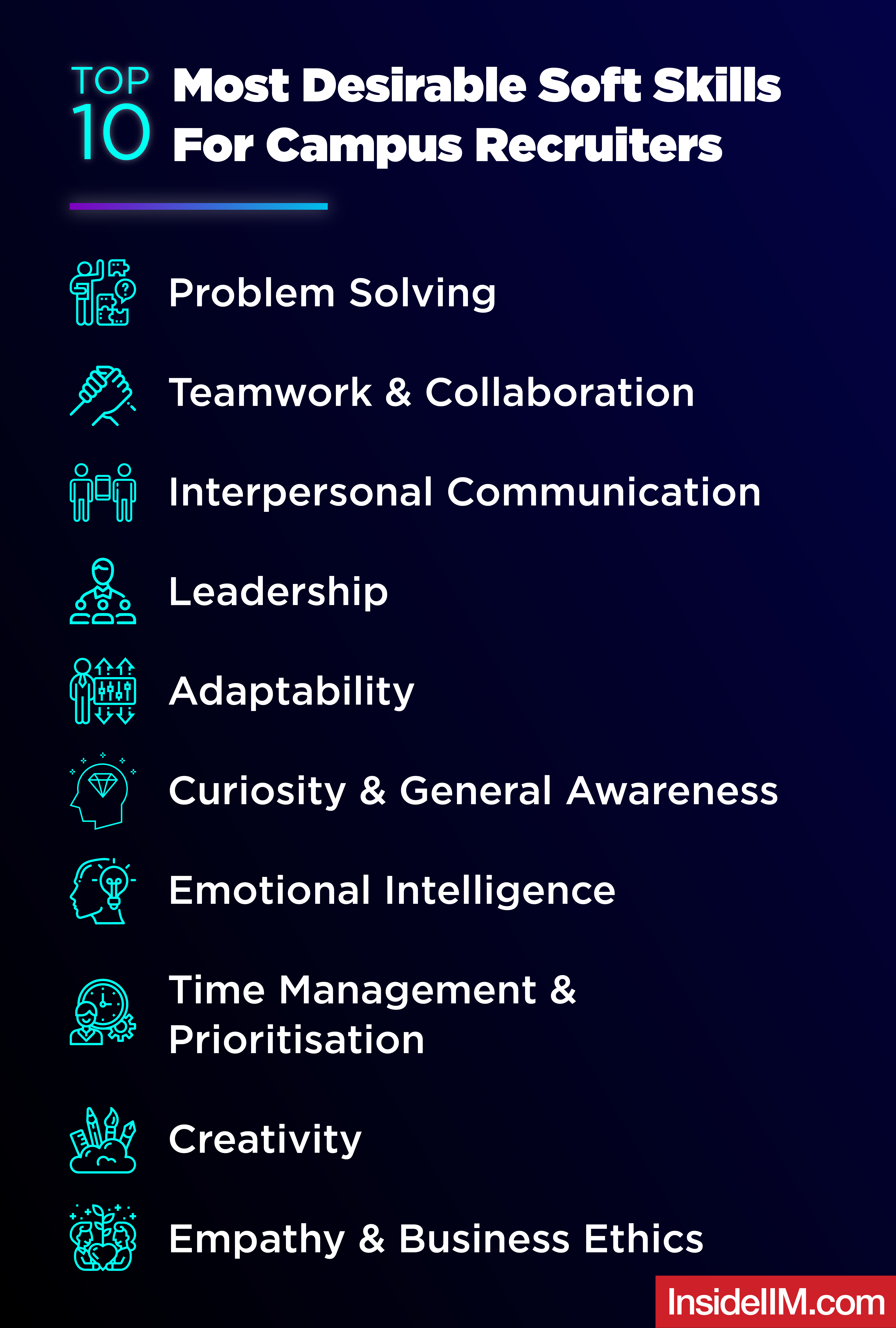
From the graphic above, the top-5 skills that MBA students need to focus on developing are problem solving, teamwork & collaboration, interpersonal communication, leadership, and adaptability.
Problem solving is one of the most important skills that management professionals need to have - their entire bread and butter revolves majorly around this one skill, regardless of whether they're Consultants or Area Sales Managers. So how does a candidate display his/her problem solving ability in an interview, especially if they do not possess prior work experience? Usually, interviews comprise of a case-study round or a case-problems like guesstimates, which can give the panel an idea of the candidate's problem solving abilities. For experienced professionals, questions may be asked about significant challenges that they faced while working, and the candidate may be asked to break down their approach to solving that problem.
Team work and collaboration is another highly important skill set to have, and for MBA students, opportunities to build this skill lie in case competitions, campus events, and live projects. These also promote the development of the next most in-demand skill, that is interpersonal communication. How effectively and clearly you communicate with your seniors, subordinates and peers goes a long way in defining what kind of a manager you become, and your organisational fit.
Top Ten Soft Skills That MBA Students Lack, As Per Top Campus Recruiters | InsideIIM MBA Skills Report 2020
In 2019, as a part of the annual InsideIIM Recruitment Survey, we asked MBA students to tell us what they thought campus recruiters could do to improve the placements process at business schools. But the placements process at b-schools is not a one-sided affair - if students are looking for recruiters to improve how they hire, recruiters are also looking for students to be more prepared and present themselves better. To find out which soft skills recruiters think are deficient in MBA students at India's top business schools, we asked respondents to reveal to us the top three soft skills missing in students.
Here's what they said:
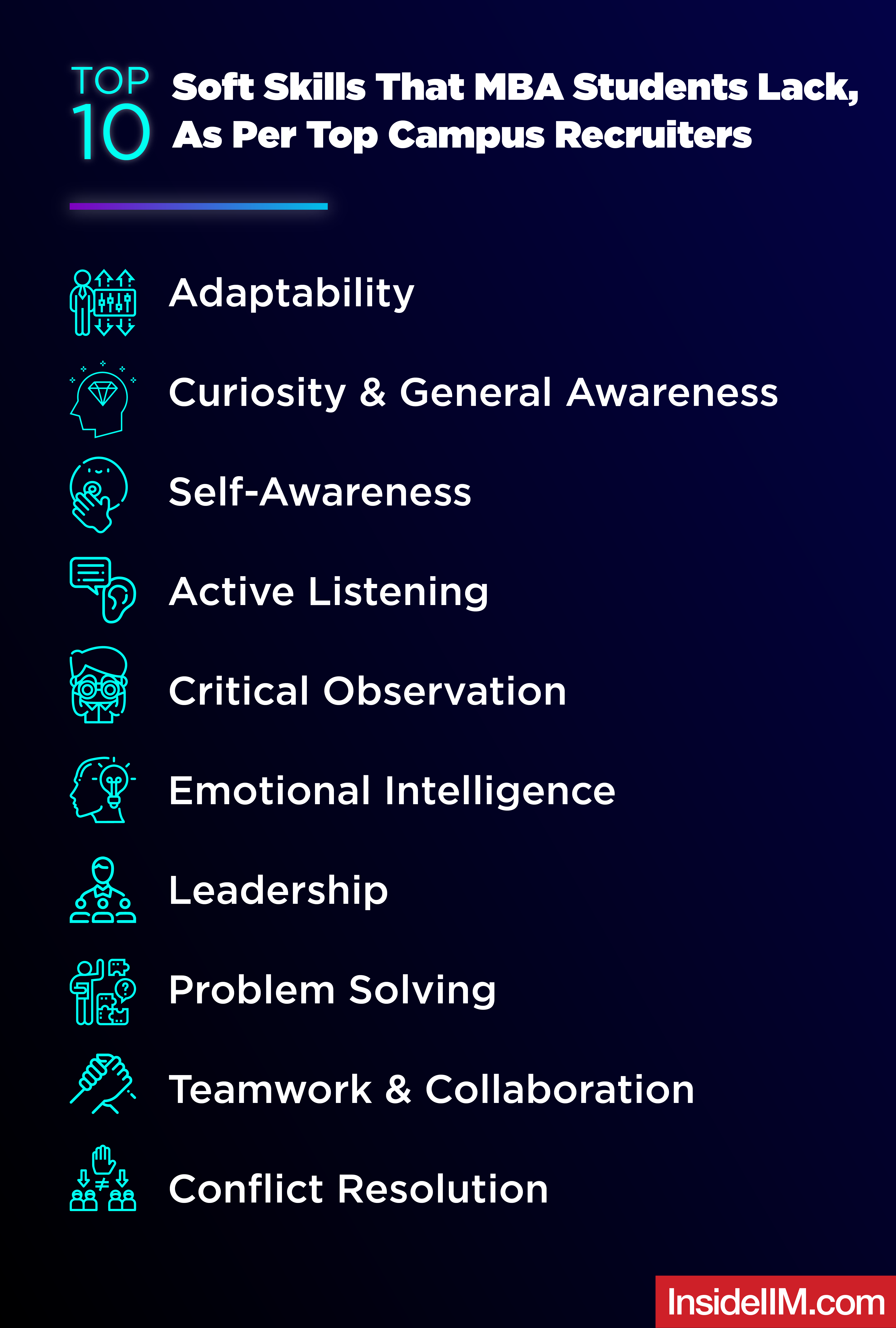
Adaptability has emerged one of the top soft skills that recruiters find lacking in MBA students. But what do recruiters mean by adaptability, and how can an MBA student display a soft-skill like adaptability even before joining the organisation? Based on multiple recruiter responses, it is most likely that by 'adaptability', recruiters mean a candidate's inclination towards being placed in any role in any city, and being open to any exposure and learning opportunities that come their way early in their careers.
Another soft skill lacking in MBA students is their level of curiosity/awareness of the organisation that they're applying to. Typically, an institute's placement committee will hand out to students a list of important pointers about an on-campus recruiter, and based on recruiter responses, it appears that MBA students do not bother to research further about an organisation with which they could potentially begin their management careers with. General awareness also appears to be lacking in MBA students.
The third soft skill that recruiters feel MBA students are currently deficient in is self-awareness. By this, recruiters most likely mean that MBA students are themselves unsure of what kind of roles they're looking for, and what kind of careers they see for themselves. "Generic answers won't get them anywhere" is what one top b-school recruiter had to say about MBA students in the survey that was floated by InsideIIM. Recruiters believe that clarity of thought in determining a career path can save both them and the student a lot of time and energy, and can help them source the best and most relevant talent for their organisation.
It is interesting to note that amongst the top-10 most desirable soft skills as per b-school recruiters, MBA students are deficient in 60% of the most desirable soft skills including leadership, emotional intelligence, problem solving, teamwork and collaboration, curiosity and general awareness, and adaptability. This is a major concern that MBA students and business schools need to immediately take cognizance of, especially now that they know in explicit terms as to what campus recruiters are looking for in the ideal candidate for their respective organisations.
Top Five Most Desirable Hard Skills For Campus Recruiters | InsideIIM MBA Skills Report 2020
To find out the top-5 hard skills that campus recruiters look for while hiring from business schools, we asked respondents to select from various options the top three hard skills that an ideal MBA graduate must possess to be a good fit for their respective organisations. Here's what they said:
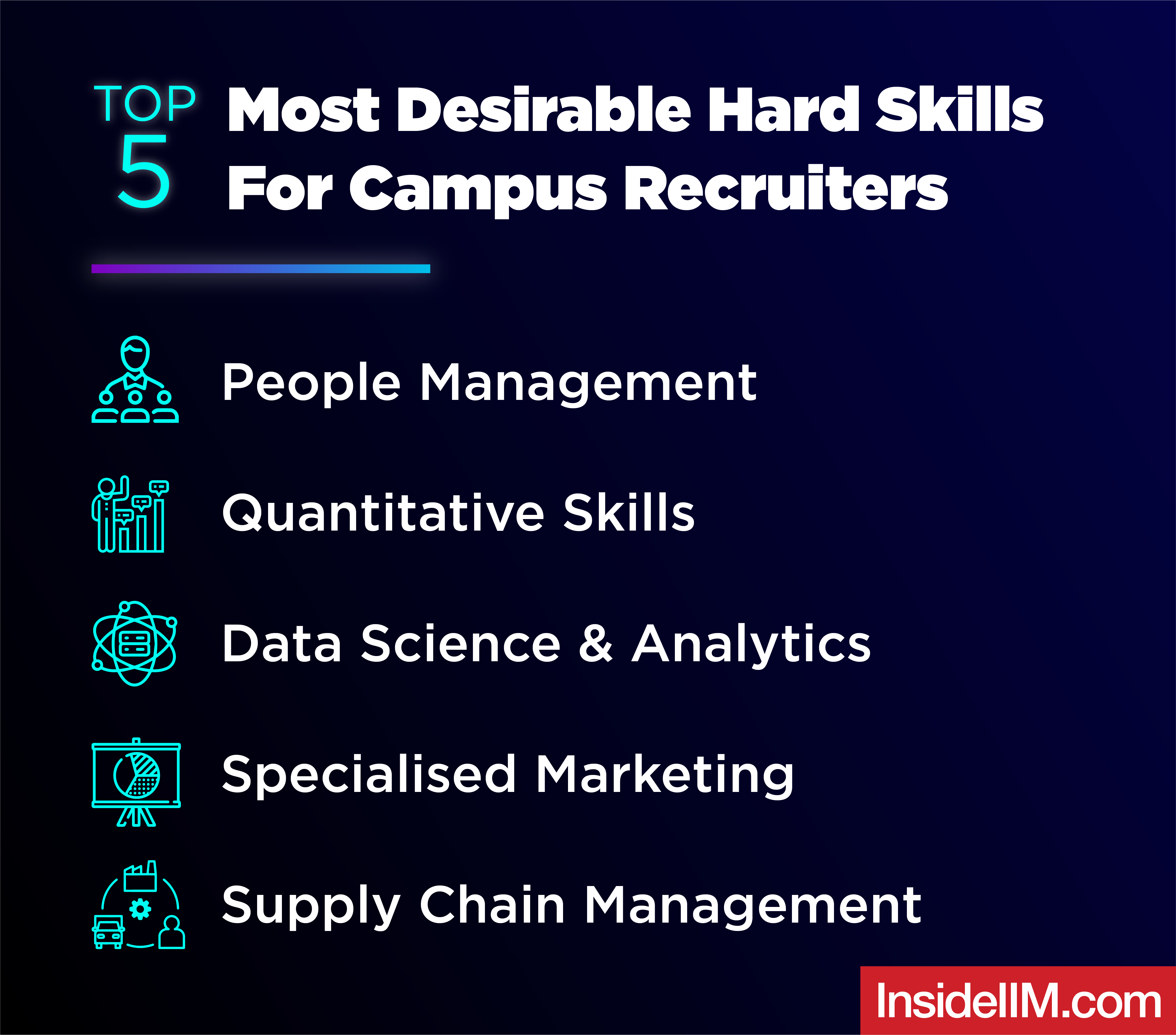
How Important Previous Work Experience Is For Campus Recruiters | InsideIIM MBA Skills Report 2020
This is one of the biggest conundrums that MBA aspirants have in their minds - MBA with or without work experience? How does work experience have an impact during placements? Do recruiters give preference to those with prior work experience? Will freshers miss out on great job opportunities simply because they didn't work before joining a business school? To cut through the ambiguity and hear it from the horse's mouth, we asked top campus recruiters the question - "How important is past work experience to your organisation while recruiting candidates?" Here's how they ranked the importance of work experience while shortlisting candidates for their respective organisations.
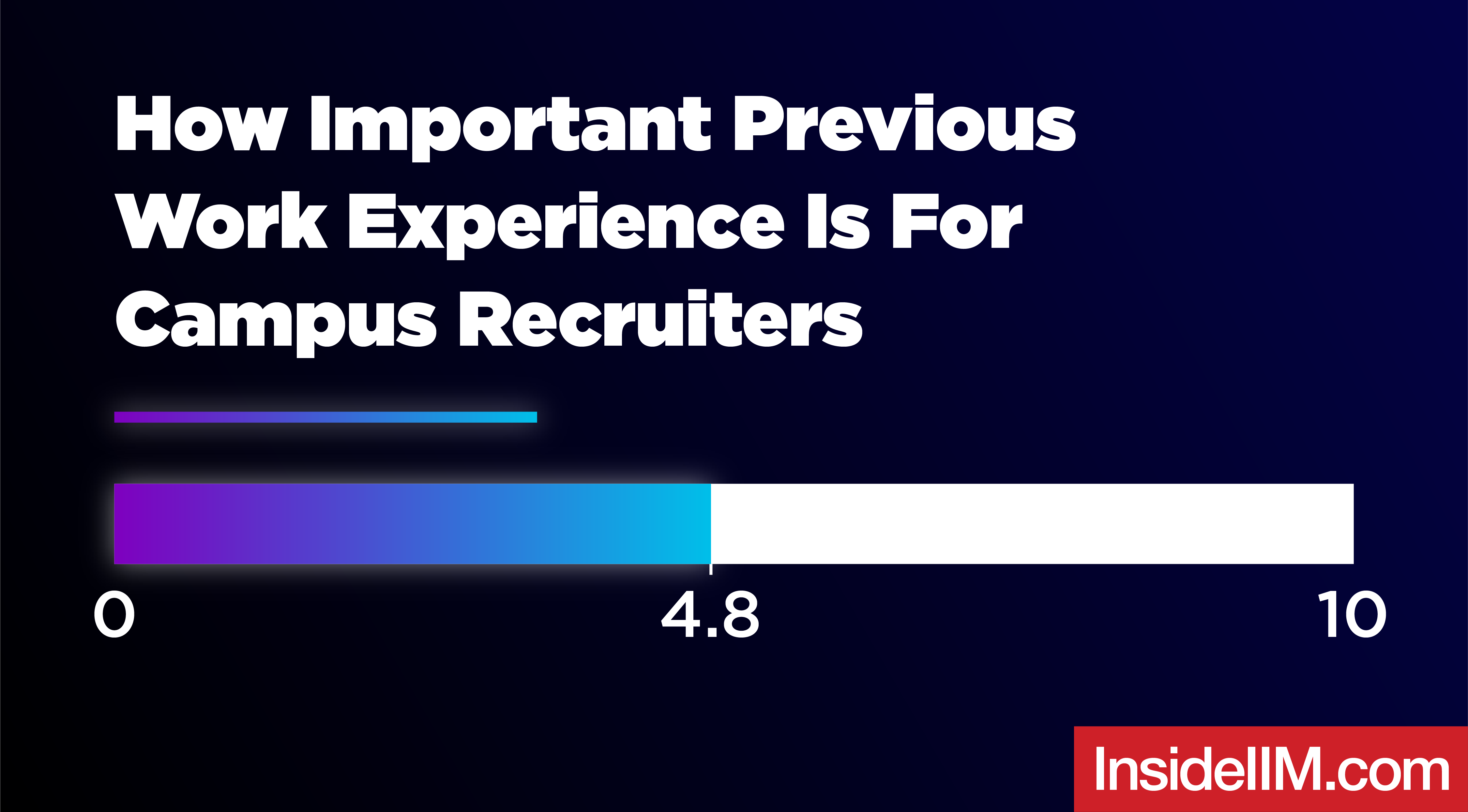
Based on the average rating given by top b-school campus recruiters, it emerges that work experience is NOT as important to campus recruiters as previously thought, with respondents giving an average score of less than 5 on 10.
It is important to understand, before drawing general conclusions from the recruiters' responses, that the majority of recruiter respondents partaking in our survey majorly hire for Sales & Marketing, Human Resource Management, Operations and Supply Chain Management and General Management roles. Therefore, it may be the case that for these recruiters, work experience may not be an influential criterion in the selection process but for companies hiring for Consulting, Product Management, Operations etc. work experience may be crucial.
As we come out with further iterations of this report in the coming years, we hope to present a more holistic view of recruiter opinions by including a larger number of recruiters from a wider spectrum of industries.
How Important The Eminence of A Candidate's Undergraduate Institute Is, As Per Top Campus Recruiters
Does an IITian have a better chance of making it to a top company as compared to someone from a tier-2 engineering institute? Would recruiters prefer to hire an SRCC/LSR graduate over others, simply because of the eminence of their institute? To find out how important the brand of a candidate's undergraduate college is in making the decision to hire/him her, we asked recruiters the question - "What role does the eminence of a candidate’s undergraduate institute play in the recruitment process?" Here's what we found.
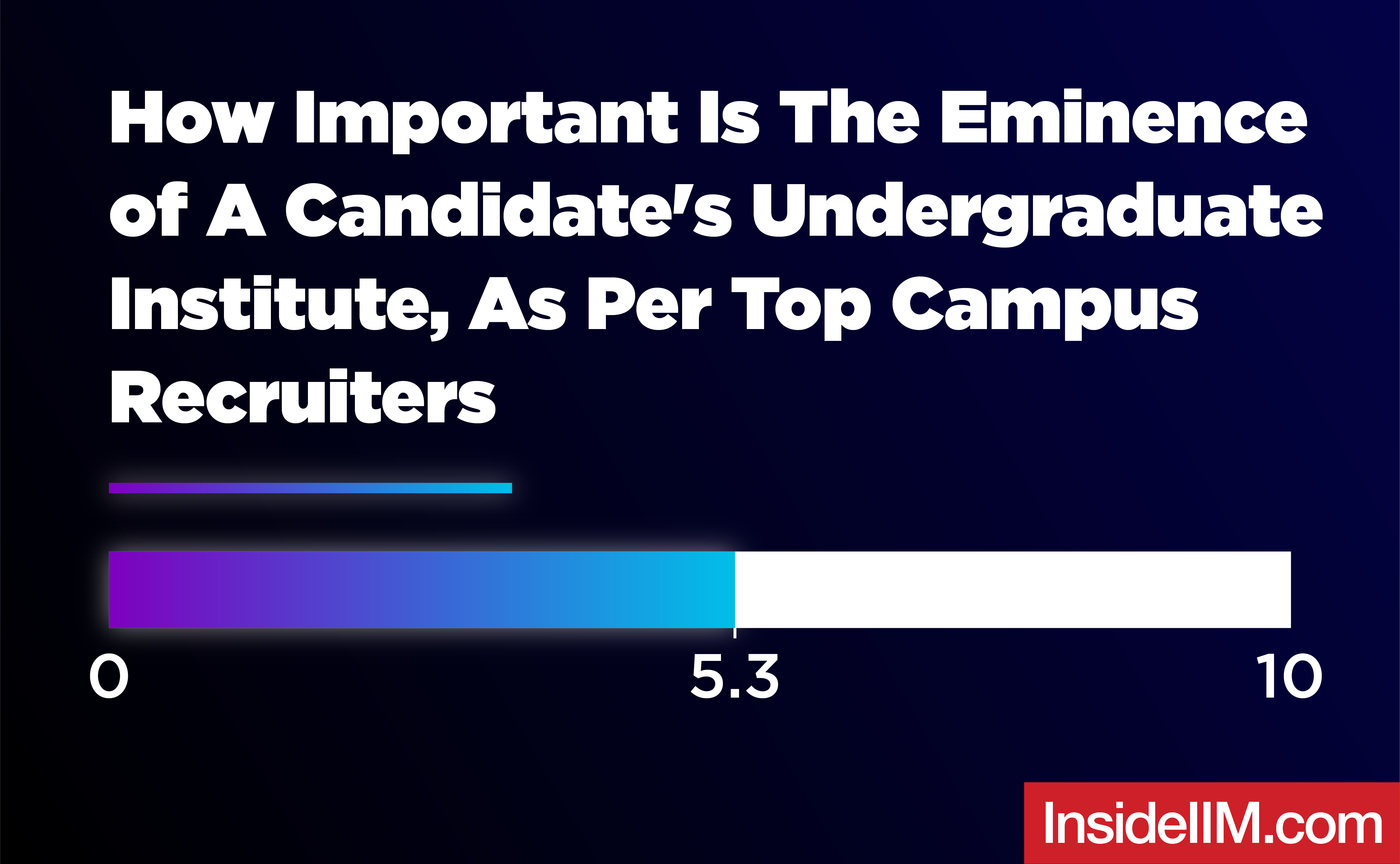
It turns out that, on average, b-school recruiters have a neutral opinion about the eminence of candidates' undergraduate institutes when hiring them for various roles in their organisations.
It is important to note that the majority of recruiter respondents partaking in our survey majorly hire for Sales & Marketing, Human Resource Management, Operations and Supply Chain Management and General Management roles. Therefore, it is likely that if you're applying for any of these roles, where you completed your graduation will be inconsequential to your chances of getting selected by an organization, though the sample set of respondents is not large enough to be certain of this.
How We Made This Report, And What We Aim To Achieve
As a part of the InsideIIM Campus Recruiters Survey for 2020, an extensive survey was floated by Team InsideIIM to various recruiters who hire from India's top business schools. Representatives of 24 companies spread across various industries took part in the survey. Through the Campus Recruiters Survey, we aim to bring in a degree of balance to the Indian placements process by serving as a bridge of communication between B-school placement committees and campus recruiters. We are hopeful that MBA students and business schools take cognizance of this report and its contents and find it helpful in improving the placements processes at their respective institutes.
For future iterations of this report in the coming years, we aspire to gather a wider base of recruiter responses to get a more clear and complete understanding of recruiters' perceptions of India's top business schools.
Read next - 25 Things That Top Campus Recruiters Want B-School Students To Know
